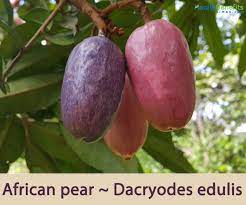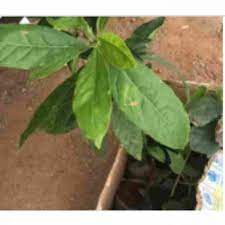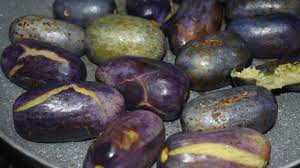No products in the cart.
Return To Shop
0
₦0.00
0
Shopping cart (0)
Subtotal: ₦0.00
Spend ₦500.00 to get free shipping Congratulations! You've got free shipping.
Log in / Sign up
Login Register
Avocado Seedlings
₦2,300.00


Miracle fruit seedlings (Sweet...
₦1,000.00
Local Pear| Native Pear (Ube) seedling
₦2,500.00
Local Pear| Native Pear (Ube) seedling
The oliferous fruit tree Safou Dacryodes edulis, also known as native pear, butter fruit, Ube and Eleme, African Pear, or African Plum, is found in humid equatorial and tropical areas.
-
Delicious and nutritious: The Ube is a delicious and nutritious fruit that is sure to please your taste buds.
-
Fast-growing and easy-to-care-for: The Ube seedling is a fast-growing and easy-to-care-for tree that is perfect for beginners.
-
Beneficial for health: The Ube has been shown to have a number of health benefits, including improved digestion and reduced risk of heart disease.
-
Versatile ingredient: The Ube can be eaten fresh, cooked, or used in a variety of recipes.
We provide African Pear seedlings for sale.
We market nationally
25 people are viewing this product right now
Please, activate Compare option to use this widget.
SKU: local-pear-native-pear-ube-seedling Categories: Seedling, Seeds & Seedlings Tags: Local Pear, Native Pear, seedling, Ube
Estimated delivery:4 days
Share:
Local Pear| Native Pear (Ube) seedling
Local Pear| Native Pear (Ube) seedling is a delicious and nutritious fruit native to West Africa. It is a rich source of vitamins, minerals, and antioxidants, and has been shown to have several health benefits. The Ube is also a versatile ingredient that can be used in a variety of dishes.
Local Pear| Native Pear (Ube) seedling Features
-
Fast-growing and easy to care for: The Ube seedling is a fast-growing tree that can reach up to 30 meters in height. It is also relatively easy to care for and can thrive in a variety of climates.
-
Highly nutritious: The Ube is a rich source of vitamins, minerals, and antioxidants. It is a good source of vitamin C, potassium, and fiber.
-
Delicious and versatile: The Ube has a sweet and slightly tart flavor that is similar to a pear. It can be eaten fresh, cooked, or used in a variety of recipes.
-
Beneficial for health: The Ube has been shown to have several health benefits. It is a good source of antioxidants, which can help protect the body from damage caused by free radicals. The Ube is also a good source of fiber, which can help promote digestive health.
Benefits of Local Pear| Native Pear (Ube) seedling for Nutrition
African pear seedlings develop into trees that bear fruits rich in vitamins and minerals and are essential for regulating blood sugar levels. It prevents the spike in blood sugar levels that leads to diabetes.
Second, because it contains natural folic acid, it is a superfruit for pregnant women. Bush pears’ folic acid content helps to avoid deficits in a baby’s brain and spinal cord.
prevent cancer. The pears are regarded as fruits that are least prone to induce allergy responses in people, or hypoallergenic fruits.
The African pear is also rich in calcium and phosphorus, two nutrients that are mostly found in our body’s bones and teeth.
Frequently Asked Questions (FAQs) for Local Pear (Ube) Seedling
What is a Local Pear (Ube) seedling?
The Local Pear or Native Pear (Ube) seedling is a fruit tree native to West Africa. It produces delicious and nutritious pears similar to regular pears but with a slightly tart flavor.
Is the Local Pear (Ube) easy to grow?
Yes! The Ube seedling is known for its fast growth and ease of care. It can thrive in various climates, making it a suitable choice for many regions.
What are the health benefits of the Local Pear (Ube)?
The Ube is a rich source of vitamins, minerals, and antioxidants. It offers benefits like:
- Blood Sugar Regulation: May help prevent spikes in blood sugar levels.
- Prenatal Health: Contains natural folic acid, crucial for pregnant women.
- Cancer Prevention: Studies suggest potential anti-cancer properties.
- Bone Health: Rich in calcium and phosphorus for strong bones and teeth.
- Digestive Health: A good source of fiber for promoting gut health.
How can I use Local Pears (Ube)?
Ube pears are versatile! Enjoy them fresh, cooked, or incorporate them into various recipes like jams, pies, or baked goods.
Only logged in customers who have purchased this product may leave a review.



Reviews
There are no reviews yet.